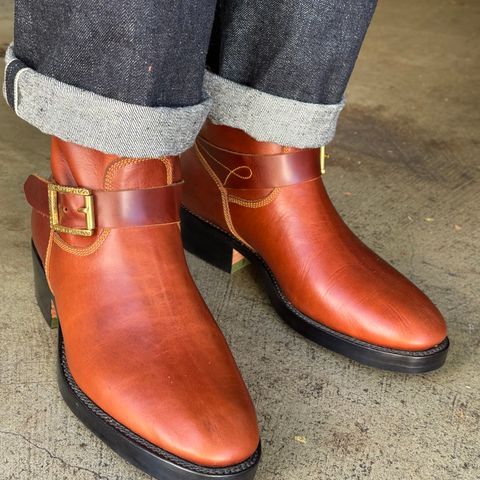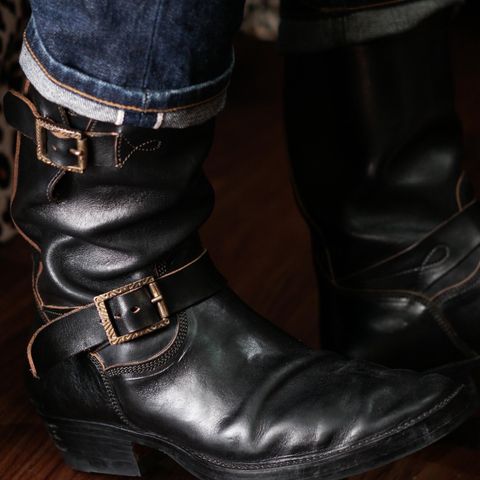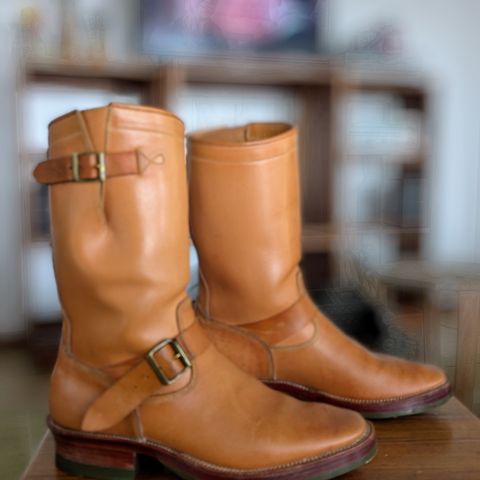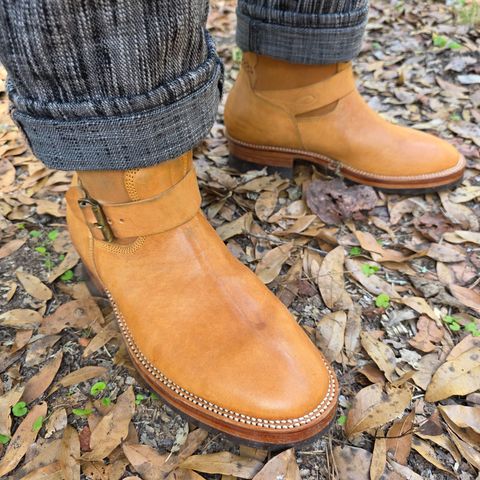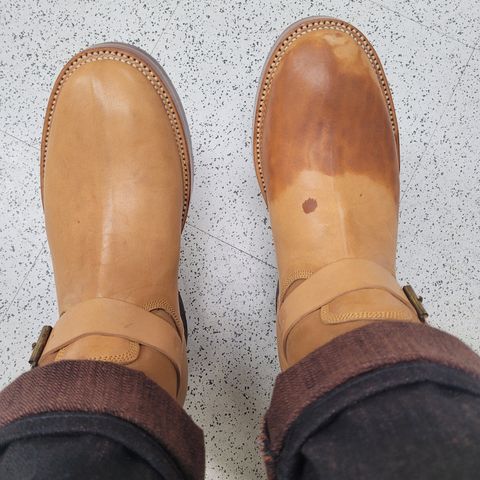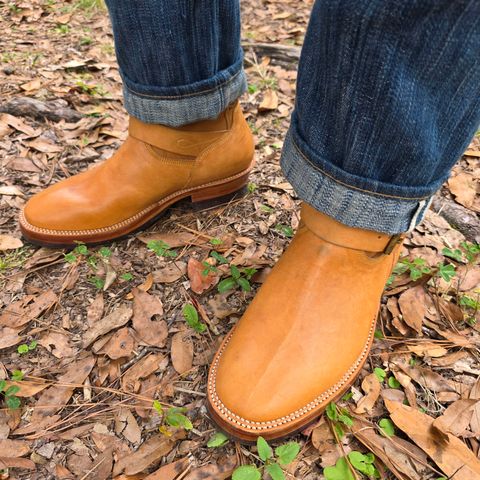About
The Tapak 2.0 Engineer Boots are a specialized boot model produced by Fortis Boots, an Indonesian bootmaker renowned for handmade heritage footwear. The Tapak 2.0 represents Fortis's interpretation of the classic engineer boot style, combining traditional Indonesian craftsmanship with modern materials and construction techniques while maintaining the authentic characteristics that define engineer boots.
About
The Tapak 2.0 Engineer Boots are a specialized boot model produced by Fortis Boots, an Indonesian bootmaker renowned for handmade heritage footwear. The Tapak 2.0 represents Fortis's interpretation of the classic engineer boot style, combining traditional Indonesian craftsmanship with modern materials and construction techniques while maintaining the authentic characteristics that define engineer boots.
Fortis's Tapak 2.0 model demonstrates the company's expertise in creating specialized heritage footwear that appeals to both collectors and practical users. The boots showcase Indonesian leather options and traditional handwelting techniques, positioning Fortis as a notable contributor to the global engineer boot tradition while highlighting Southeast Asian craftsmanship excellence.
Engineer Boot Heritage
Engineer boots originated as protective footwear for railroad workers and industrial applications, characterized by their high shaft design, buckle closures, and robust construction. The style emerged from practical necessity, providing protection against workplace hazards while allowing for easy on-and-off functionality essential for workers who needed reliable, durable footwear.
The traditional engineer boot design features a tall shaft that extends well above the ankle, typically secured with adjustable straps and buckles rather than laces. This design provides protection against debris and impacts while maintaining the structural integrity necessary for demanding work environments. The pull-on style allows for quick donning and removal, essential for workers transitioning between different work situations.
Over time, engineer boots have evolved from purely functional workwear to become appreciated within heritage fashion and motorcycle culture. The Tapak 2.0 continues this tradition, maintaining authentic design elements while incorporating contemporary construction quality and Indonesian craftsmanship sensibilities.
Construction and Specifications
The Tapak 2.0 Engineer Boots feature hand-lasted and hand-stitched construction, demonstrating Fortis's commitment to traditional bootmaking techniques. The construction quality is characterized by incredibly neat, tight, and uniform stitchwork throughout the boot, with excellent finishing and attention to detail that reflects Indonesian craftsmanship standards.
Key design elements include a low profile toe design that provides a sleeker silhouette compared to traditional engineer boots, combined with a slimmer boot shaft that maintains protection while offering improved comfort and aesthetics. The boots feature a slightly chunkier woodsman heel that provides stability and durability while contributing to the boot's authentic heritage appearance.
Signature loop stitch patterns are featured throughout the boot construction, demonstrating Fortis's attention to decorative elements that enhance both functionality and visual appeal. The unstructured toe design maintains comfort while preserving the characteristic engineer boot silhouette that defines the style.
The Tapak 2.0 is built on Fortis's El Primero Last, which provides true-to-size fitting for most customers. Custom fitting options are available based on foot tracings and measurements, reflecting the company's commitment to personalized service and optimal fit for each customer.
Materials and Options
Fortis offers the Tapak 2.0 in multiple Indonesian leather options, showcasing the quality and variety of local leather production. Available leather choices include Indonesian Dark Brown Pull Up, Cisarua Indonesian Natural Vegtan, and Indonesian Red Brown Pull Up, each offering distinct characteristics and aging properties.
The emphasis on Indonesian leather reflects Fortis's commitment to supporting local leather production while demonstrating the quality achievable through domestic tanning and finishing processes. These leather options provide customers with choices that affect both appearance and long-term aging characteristics, allowing for personalization based on individual preferences.
Sole options include traditional leather soles for customers who prefer classic construction, as well as Dr. Sole #1090 Supergrip Half Sole with Army Green/Yellow Plugs for enhanced traction and durability. The sole choice allows customers to prioritize either traditional aesthetics or practical performance based on intended use.
Ordering and Customer Experience
Fortis operates through direct communication channels, with orders typically submitted through Instagram like most Indonesian bootmakers. The ordering process involves personal communication with the company to discuss specifications, sizing, and customization options, reflecting the personalized approach characteristic of Indonesian bootmaking.
Pricing for the Tapak 2.0 Engineer Boots is approximately $450 shipped, with payment typically structured as half at order initiation and half upon completion. This pricing structure reflects the handmade construction quality while remaining competitive within the heritage footwear market.
Lead times are quoted at 8-10 weeks, with actual delivery typically occurring within 11 weeks. The production timeline reflects the handmade approach and attention to detail that characterizes Fortis's construction process, allowing adequate time for quality construction and finishing.
Customer service is consistently reported as excellent, with responsive communication throughout the production process and attention to customer concerns and requirements. This approach maintains the personal relationship between craftsman and customer that defines Indonesian bootmaking culture.
Indonesian Bootmaking Context
The Tapak 2.0 emerges from Indonesia's established bootmaking tradition, demonstrating how local craftsmen have adapted international boot styles while maintaining authentic construction quality. Indonesian bootmakers have gained recognition for their ability to produce heritage-quality footwear that competes with established American and European manufacturers.
Fortis's approach to engineer boot construction reflects the broader Indonesian emphasis on traditional techniques combined with contemporary materials and customer service. This combination allows for the creation of boots that maintain authentic styling while benefiting from modern improvements in materials consistency and construction precision.
The success of models like the Tapak 2.0 demonstrates Indonesian bootmakers' ability to interpret classic American workwear styles while adding distinctive elements that reflect local craftsmanship traditions. This approach has contributed to the growing international recognition of Indonesian bootmaking quality and value.
Heritage Footwear Significance
The Tapak 2.0 Engineer Boots represent the global nature of contemporary heritage footwear, where traditional American work boot styles are interpreted by international craftsmen using local materials and techniques. This cultural exchange enriches the heritage footwear landscape while supporting traditional craftsmanship in different regions.
The model appeals to heritage footwear enthusiasts who value both authentic styling and quality construction, regardless of geographic origin. The attention to traditional engineer boot characteristics combined with Indonesian craftsmanship quality provides an alternative to established American manufacturers while maintaining respect for the style's heritage.
Fortis's success with the Tapak 2.0 contributes to the broader acceptance of Indonesian bootmakers within global heritage footwear markets, demonstrating that quality construction and attention to detail transcend traditional manufacturing centers.
References
"Fortis Boots". Boots of Indonesia. Retrieved September 23, 2025.
"Fortis Boots Tapak 2.0 Engineer Boots Review (Dark Brown)". Patina Project. Retrieved September 23, 2025.
"Fortis Tapak 2.0 Engineer Boots Review (Natural Vegtan)". Patina Project. Retrieved September 23, 2025.
"Fortis Boots Indonesia". Instagram. Retrieved September 23, 2025.
"Fortis Tapak 2.0 Engineer Boots Photos". Patina Project. Retrieved September 23, 2025.
"Fortis Boots Tapak 2.0 Product Information". Patina Project. Retrieved September 23, 2025.
